
Falcon Flew To NCAA Distance Glory
Like his surname, Joe Falcon always swooped in at the right moment.
Known for his ferocious kick late in the race, Falcon captured seven individual NCAA titles between cross country, indoor track & field and outdoor track & field while competing for the University of Arkansas under legendary USTFCCCA Hall of Fame coach John McDonnell.
Falcon’s winning ways nearly started in the fall of his sophomore year at the 1986 NCAA Division I Cross Country Championships in Tucson, Arizona, but a recessed sprinkler head had other ideas. The Razorback standout ran on the shoulder of eventual winner Aaron Ramirez for most of the race before pulling away as they ascended the final hill. Shortly after, Falcon stepped in a sprinkler hole on the golf course, tumbled to the ground and had to settle for a runner-up finish (Don’t worry: Falcon atoned for that mishap the following year to become the program’s first individual national champion in cross country).
That incident most likely fueled Falcon’s fire over the next few years as little kept him from NCAA glory from that point forward.
After winning his first NCAA title the following March in the indoor 3000 meters, Falcon closed in a scintillating 55.1 to capture the 10,000-meter crown at the 1987 NCAA Division I Outdoor Track & Field Championships. That would be the first of seven 10K crowns for the Razorbacks over the years, which has helped them become the highest-scoring program in that event in meet history.
Falcon went back-to-back in the indoor 3000 the following year and added the mile crown to his ledger for good measure. When he returned to the outdoor meet a few months later, Falcon had his eyes squarely set on the 1500-meter title, something only one other man in program history was able to bring back to Fayetteville (Frank O’Mara in 1983).
True to form, Falcon stayed right behind the leader (Steve Balkey of Penn State) and blew past him in the final 500 meters. Falcon had company, though, as the Indiana duo of Mark Deady and Charles Marsala went with him. The Razorback runner held off the Hoosiers’ harriers to win by one second, 3:38.91 to 3:39.91 (Marsala) and 3:39.92 (Deady).
To this day, Falcon remains the only man in meet history to win national titles in both the 1500/mile and the 10,000 meters — and is just one of two men to score in both of those events at the national meet in his career (Two-time The Bowerman finalist Lawi Lalang is the other, winning the 10K title in 2013 and finishing runner-up in the 1500 one year later).
Falcon snagged another NCAA indoor mile crown in 1989 and anchored the Arkansas DMR team to an all-time world best in the DMR at the Penn Relays that same year. However, Falcon’s quest to defend his 1500-meter crown fell 1200 meters short in June after he was tripped and pushed to the ground less than one lap into the NCAA final, in what would be his final collegiate race.
The NCAA and collegiate track & field will mark a momentous milestone in the spring of 2021 -- the 100th anniversary of the NCAA Championships and with that, the NCAA Track & Field Championships. In June 1921, the University of Chicago hosted the first track & field championships in NCAA history.
This point can’t be emphasized enough: Not only was the event the first for NCAA track & field, but the first championships for any sport under the sponsorship of the NCAA.
To celebrate, over each of the next 365 days, the U.S. Track & Field and Cross Country Coaches Association (USTFCCCA) will celebrate moments, student-athletes, and coaches that have made a century’s worth of championships special. From humble beginnings to important historical milestones to the modern-day, collegiate track & field has evolved with the American society.
The 2021 edition of the NCAA Division I Outdoor Track & Field Championships begin with preliminary round action on May 27-29 in Jacksonville, Fla., and College Station, Texas. The championships final site and culmination of the celebration is slated for June 9-12, 2021 at the newly rebuilt Hayward Field in Eugene, Ore.
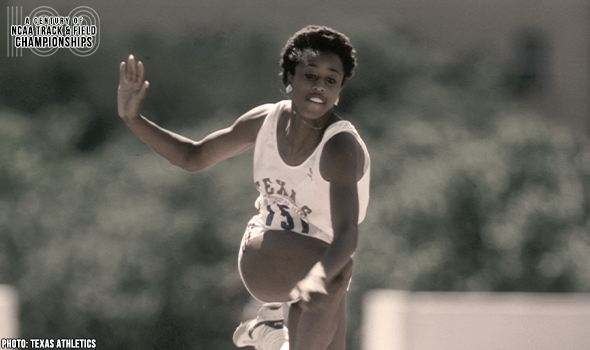
Texas’ Turner Soared To Triple Jump Greatness
Terri Turner was a two-time TJ champion at the NCAA DI Outdoor T&F Championships. When Turner won her 2nd title in 1986, she set an all-time world best of 13.66m (44-9¾).
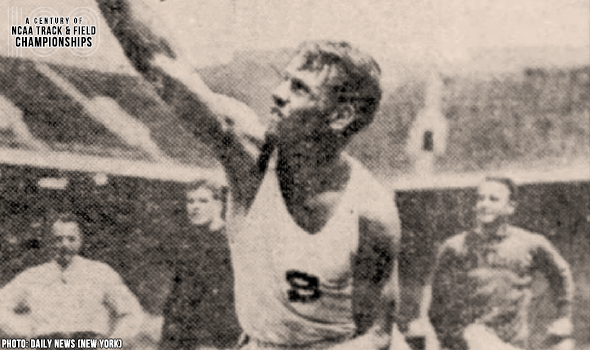
Stanford’s Rothert Starred In The Shot Put
Harlow Rothert won three consecutive shot put titles at the NCAA Outdoor T&F Championships between 1928 & 1930. He set meet records in both 1929 and 1930.

Indiana’s Kharun Set Javelin MR In 2003
Irina Kharun won the javelin title at the 2003 NCAA DI Outdoor T&F Championships with a meet record heave of 61.82m (202-10). It also helped her win by more than 30 feet!
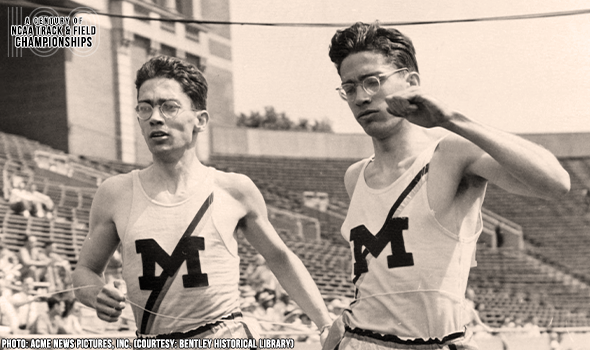
Hume Brothers Had Officials Seeing Double
Twins Robert & Ross Hume purposefully tied for the mile crown at the 1944 NCAA Outdoor Track & Field Championships. They tried again in 1945, but officials gave Ross the win.
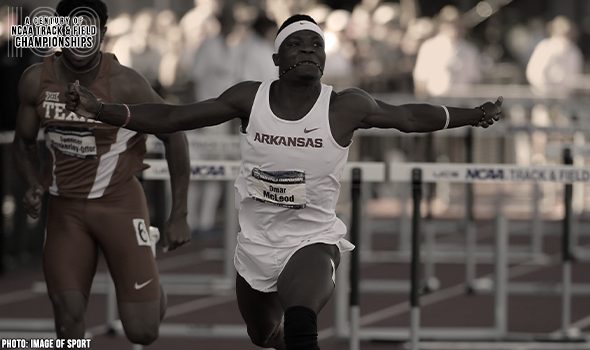
Woo Pig Sooie! McLeod Sizzled Track In 2015!
Omar McLeod clocked a sizzling 13.01 (+3.9) to win the 110HH at the 2015 NCAA DI Outdoor T&F Championships. Only one man had ever gone faster in meet history at the time.

Felicien Starred In The 100H At NCAAs
Perdita Felicien won back-to-back 100H titles at the NCAA Division I Outdoor T&F Championships in 2002 & 2003. She set a MR of 12.68 in the semifinals on the way to title No. 2.

Truly “Unbroken,” Zamperini Shined At NCAAs
Louis Zamperini set a meet record in the mile of 4:08.3 at the 1938 NCAA Outdoor T&F Championships. Zamperini, who also won the mile in 1939, saw his record last 15 years.
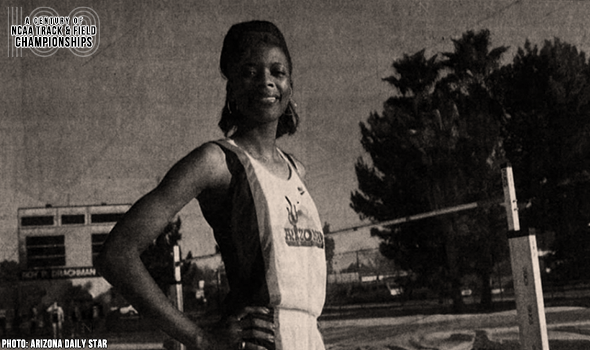
Hughes Soared To Three Consecutive HJ Titles
Tanya Hughes was the first woman to win three high jump titles at the NCAA Division I Outdoor T&F Championships. Hughes did so consecutively in 1991, 1992 & 1993.
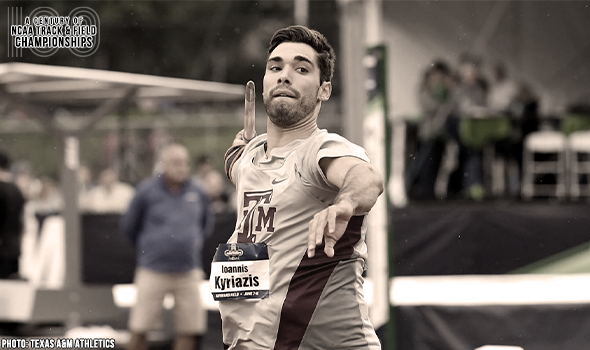
Kyriazis Made Point With Javelin In 2017
Ioannis Kyriazis set a meet record in the javelin of 82.58m (270-11) and won by more than 19 feet at the 2017 NCAA DI Outdoor T&F Championships.
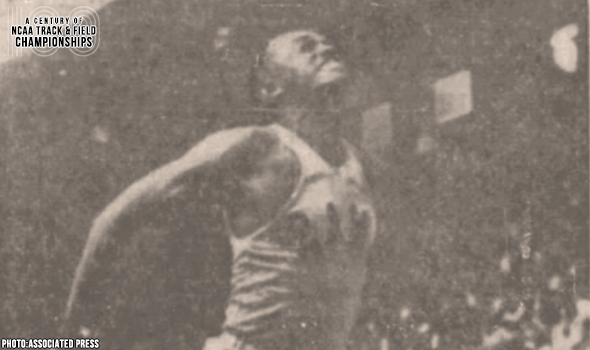
Sharpe Bounded To Meet History In 1956
Bill Sharpe became the first man to eclipse the 50-foot barrier in the triple jump at the NCAA DI Outdoor T&F Championships in 1956. Sharpe won with his 15.36m (50‑4¾) effort.

